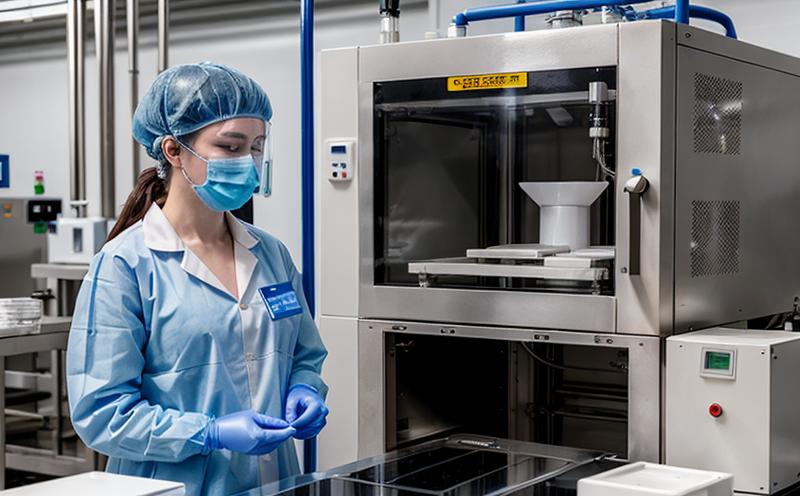GMP Incoming Material Quality Control Testing
In today’s highly regulated pharmaceutical industry, ensuring that incoming materials meet Good Manufacturing Practice (GMP) standards is critical to maintaining product quality and patient safety. GMP Incoming Material Quality Control Testing provides a robust framework for evaluating raw materials, excipients, and intermediates before they are incorporated into the manufacturing process.
GMP regulations are designed to ensure that pharmaceutical products are consistently produced and controlled at high quality levels from development through commercial production. This includes ensuring correct identity, strength, purity, and quality of all incoming materials. Proper testing ensures compliance with regulatory standards such as ISO 10012 for measurement systems.
The process involves a series of tests aimed at verifying that the material meets established specifications and does not contain any contaminants or impurities. This includes physical, chemical, microbiological, and biological testing as per ISO guidelines.
The aim is to ensure that all incoming materials are fit for use in the pharmaceutical process. Failures at this stage can lead to significant delays or even batch rejections, which could impact production schedules and disrupt supply chains. Thus, a thorough quality control testing regime is essential to safeguard the integrity of the manufacturing process.
Testing typically involves multiple stages including:
- Sampling: Representative samples are taken from incoming materials using appropriate techniques.
- Identification Testing: This verifies the identity of the material by comparing it to known standards.
- Analytical Testing: Chemical analysis is performed to ensure that the material meets specified purity levels and does not contain prohibited substances.
- Microbiological Testing: Bacterial, fungal, and viral contamination checks are conducted to prevent introduction of pathogens into the manufacturing process.
- Biological Activity Testing: For materials with specific biological functions, testing ensures their expected activity levels.
- Stability Studies: The material's stability over time is assessed under various conditions to ensure long-term viability.
The results of these tests are critical for making informed decisions about the suitability of incoming materials. Any discrepancies from specified standards can lead to corrective actions such as retesting, rejection, or even destruction of contaminated batches.
By adhering to GMP guidelines during this testing process, pharmaceutical manufacturers not only ensure compliance with regulatory requirements but also protect public health by preventing the use of substandard materials in drug production. This commitment to quality is a cornerstone of the industry’s reputation and trustworthiness.
Scope and Methodology
The scope of GMP Incoming Material Quality Control Testing encompasses all aspects related to ensuring that incoming raw materials, excipients, intermediates, and other components are suitable for use in pharmaceutical manufacturing. This includes the following key areas:
- Physical Properties: Inspection and measurement of physical attributes such as size, shape, color, and density.
- Chemical Composition: Analysis to confirm that the material contains the expected components in correct proportions.
- Biological Characteristics: Testing for biological activity and potential contaminants like microorganisms or allergens.
- Microbiological Contamination: Detection of any microbial presence, which can be harmful if introduced into a manufacturing process.
- Stability and Shelf Life: Evaluation of the material's stability over time under various storage conditions to ensure long-term reliability.
- Compliance with Regulations: Ensuring that all tests meet relevant regulatory standards, including ISO 10012.
The methodology involves a combination of advanced analytical techniques and experienced personnel who are trained in GMP practices. This ensures that every test is conducted accurately and consistently, providing reliable data for decision-making.
Advanced instrumentation used in these tests includes spectrometers, chromatographs, electron microscopes, and other high-precision equipment. These tools allow for precise measurement and analysis of even the smallest quantities of materials.
Frequently Asked Questions
Why Choose This Test
- Avoids Contamination Risks: By testing incoming materials, potential contaminants are identified early in the process, preventing them from entering the manufacturing cycle.
- Ensures Quality Consistency: Regular testing helps maintain consistent quality across all batches of pharmaceutical products.
- Meets Regulatory Requirements: Compliance with GMP and other relevant standards is guaranteed through rigorous testing protocols.
- Reduces Production Delays: Early identification of issues minimizes the need for retesting or rejection, ensuring smoother production processes.
- Promotes Safety: By identifying unsafe materials early, potential health risks are mitigated, safeguarding both patients and healthcare workers.
- Supports Reputation Building: A commitment to quality testing enhances the reputation of pharmaceutical companies in the market.
Customer Impact and Satisfaction
Clients benefit significantly from our GMP Incoming Material Quality Control Testing services. By ensuring that only high-quality materials are used, we help clients meet regulatory requirements and maintain product integrity. This not only enhances customer satisfaction but also builds long-term trust with partners.
We understand the importance of timely delivery in pharmaceutical manufacturing. Our efficient testing processes ensure that no delays occur due to quality issues, allowing for smooth production schedules. Additionally, by providing detailed reports and insights into material suitability, we empower our clients to make informed decisions that align with their business goals.





